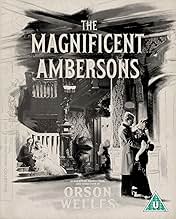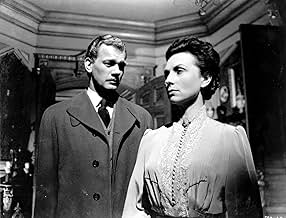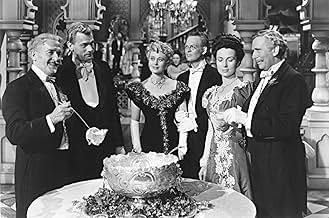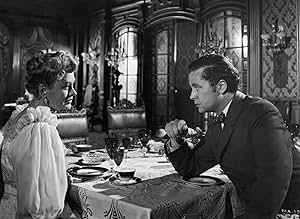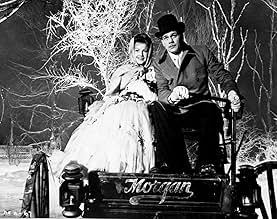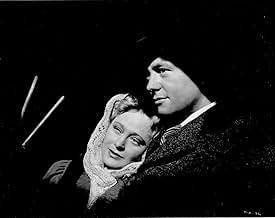CALIFICACIÓN DE IMDb
7.6/10
28 k
TU CALIFICACIÓN
El joven y consentido heredero de la decadente fortuna Amberson se interpone entre su madre viuda y el hombre a quien ella siempre ha amado.El joven y consentido heredero de la decadente fortuna Amberson se interpone entre su madre viuda y el hombre a quien ella siempre ha amado.El joven y consentido heredero de la decadente fortuna Amberson se interpone entre su madre viuda y el hombre a quien ella siempre ha amado.
- Dirección
- Guionistas
- Elenco
- Nominado a 4 premios Óscar
- 8 premios ganados y 4 nominaciones en total
Orson Welles
- Narrator
- (voz)
Edwin August
- Citizen
- (sin créditos)
Georgia Backus
- Matron
- (sin créditos)
Harry A. Bailey
- Citizen
- (sin créditos)
Olive Ball
- Mary - Maid
- (sin créditos)
Jack Baxley
- Reverend Smith
- (sin créditos)
William Blees
- Young Man at Accident
- (sin créditos)
Lyle Clement
- Citizen
- (sin créditos)
Bobby Cooper
- George Minafer as a Boy
- (sin créditos)
Don Dillaway
- Wilbur Minafer
- (sin créditos)
Opiniones destacadas
With an excellent cast, interesting characters and setting, and a thought-provoking story, dramatic cinema does not get much better than "The Magnificent Ambersons". No one will ever know what it would have been like if Orson Welles' original version had been allowed to stand as it was, but what is left is still extremely good despite the missing portions.
The story of the leading residents in a turn-of-the-century town combines some interesting themes. The snobbishness of the Ambersons, and its effects on their lives and others' lives, is illustrated alongside the ways that increasing industrialization is changing everyone's lives. The period setting is also quite interesting in its own right, and very nicely done. The characters are all convincing and well-defined, and are matched nicely with fine performers who bring them to life convincingly. Welles regulars Joseph Cotten and Agnes Moorehead are especially good.
The only real disappointment in the movie is that, due to all the cuts made against Welles' wishes, there are times when it is obvious that a scene or information is missing, since characters at times refer to events that are not quite familiar to the audience. It is fortunate that the acting and writing are good enough to help us fill in the blanks to some degree, but it is really too bad that we can never see the whole picture.
As it stands, this is a fine film filled with good scenes and memorable characters, and a movie that will be much appreciated by fans of classic cinema.
The story of the leading residents in a turn-of-the-century town combines some interesting themes. The snobbishness of the Ambersons, and its effects on their lives and others' lives, is illustrated alongside the ways that increasing industrialization is changing everyone's lives. The period setting is also quite interesting in its own right, and very nicely done. The characters are all convincing and well-defined, and are matched nicely with fine performers who bring them to life convincingly. Welles regulars Joseph Cotten and Agnes Moorehead are especially good.
The only real disappointment in the movie is that, due to all the cuts made against Welles' wishes, there are times when it is obvious that a scene or information is missing, since characters at times refer to events that are not quite familiar to the audience. It is fortunate that the acting and writing are good enough to help us fill in the blanks to some degree, but it is really too bad that we can never see the whole picture.
As it stands, this is a fine film filled with good scenes and memorable characters, and a movie that will be much appreciated by fans of classic cinema.
In this part of his career, Welles was interested in a few things. Thankfully we don't need the completed project to at least see what they were. And the understanding of them is probably more important than experiencing a coherent survey, as this was.
He's interested in surrounding a narrative, in giving it to us from all sides. He does this in narrative styles. In "Kane" he had narrators inside and outside the story, newsreels, newspapers, mysterious unfoldings, anticipated long events, and anticipated short ones.
He does it in the eye as well, having the camera surround and probe. And he plays these two off of each other, creating one sort of rhythm in the eye, another in the shifts of narrative, yet more in the physical movements on screen and finally in the emotional tides. Each of these is innovative, but together they become metacharacters in a sort of cinematic jazz. Oddly, the metaphor doesn't include the score itself for Welles, the one thing that has become a common skill today.
Now if we had the whole project, we'd get all the variations and pace in his jazz composition. As it is now, all we get are phrases, some broken a bit.
Just settle on one that you suppose hasn't been tampered with, say the sleigh/car encounter in the snow and revel in that for a few viewings, one after the other. It is absolutely amazing what interplay these elements have. And in this case we really do have some music: the players singing.
I suggest you play it again and again until you get it. Believe me, it will change your life when you can see this mind dance.
I would rather have the pieces because they have such a perfect logic and dance, you can imagine the rest. It baffles me that some people think Welles just innovated in camera angles and lighting. No, he created a whole higher level of drama.
Van Gogh painted a starry sky. It is, in effect two paintings in one. We have the beauty of the sky. And we have the beauty of the dabs and strokes of paint on the canvas, a sort of metapainting. The two dance around each other in a way that is magical. Welles did the same here and in "Kane." Afterward, he busted other walls.
Oh, and within the story, he uses automobiles as a metaphor to muse on the effect of this new metadrama compared to his home in the simpler theater. He wonders if we will be better off once what he does catches on.
Ted's Evaluation -- 3 of 3: Worth watching.
He's interested in surrounding a narrative, in giving it to us from all sides. He does this in narrative styles. In "Kane" he had narrators inside and outside the story, newsreels, newspapers, mysterious unfoldings, anticipated long events, and anticipated short ones.
He does it in the eye as well, having the camera surround and probe. And he plays these two off of each other, creating one sort of rhythm in the eye, another in the shifts of narrative, yet more in the physical movements on screen and finally in the emotional tides. Each of these is innovative, but together they become metacharacters in a sort of cinematic jazz. Oddly, the metaphor doesn't include the score itself for Welles, the one thing that has become a common skill today.
Now if we had the whole project, we'd get all the variations and pace in his jazz composition. As it is now, all we get are phrases, some broken a bit.
Just settle on one that you suppose hasn't been tampered with, say the sleigh/car encounter in the snow and revel in that for a few viewings, one after the other. It is absolutely amazing what interplay these elements have. And in this case we really do have some music: the players singing.
I suggest you play it again and again until you get it. Believe me, it will change your life when you can see this mind dance.
I would rather have the pieces because they have such a perfect logic and dance, you can imagine the rest. It baffles me that some people think Welles just innovated in camera angles and lighting. No, he created a whole higher level of drama.
Van Gogh painted a starry sky. It is, in effect two paintings in one. We have the beauty of the sky. And we have the beauty of the dabs and strokes of paint on the canvas, a sort of metapainting. The two dance around each other in a way that is magical. Welles did the same here and in "Kane." Afterward, he busted other walls.
Oh, and within the story, he uses automobiles as a metaphor to muse on the effect of this new metadrama compared to his home in the simpler theater. He wonders if we will be better off once what he does catches on.
Ted's Evaluation -- 3 of 3: Worth watching.
If you think Citizen Kane is wonderful, then, if you haven't already seen it, find a copy of "Ambersons" as soon as you can. To me, "Ambersons" surpasses "Kane" in complexity and perhaps richness of characters. The story of the long-term results of love deferred, unrequited love, and long-suffering love, are even more interesting with Welles' direction using overlaid dialogue and odd camera angles. My favorite part is when old Major Amberson speaks to the camera and it becomes apparent he's lost his mind. Chilling. The Ambersons captures a time more than a century ago in America when passions were suppressed and civility masked a boiling interior. This film was edited severely, I've read. This is another mystery, because the remaining footage is superb. We can only wonder what the original "Ambersons" might have been.
In a Mid Western town at the turn of the century, an ostentatious family lives in an ostentatious house and arrogantly considers itself superior to all the other folks. Isabelle Amberson is the doyenne of the family, and is courted by Eugene Morgan, a bright young engineer. Isabelle rejects Eugene because of an imagined slight, and marries the worthy if unspectacular Wilbur Minafer. This sets in train a tragedy of unrequited love as Eugene continues over the years to yearn for Isabelle, while Isabelle's plain sister Fanny carries a secret flame for Eugene. Isabelle's imperious son George grows up and, thwarted in his own love for Lucy Morgan, develops an intense antipathy towards Eugene, the ever-present guest at the Ambersons' dinner table.
Welles' affection for the Booth Tarkington novel which inspired this masterpiece is easy to understand. It is set in the snowbound countryside of the northern Mid West, the very place where Welles was born and raised, and the Ambersons are just the kind of upper middle class family from which Welles sprang. More than this, George Minafer IS Welles. Spoiled and deferred to as a child, George grows up knowing no bounds to his whimsy. The monster that he becomes is oddly attractive, partly because of his utter self-belief. Welles himself was such a man. He must surely have contemplated casting himself as George: Tim Holt, who actually appears in the role, resembles Welles uncannily, with his pudgy good looks and resonant baritone speaking voice. Welles had an inordinate fondness for strawberry shortcake, and so does George.
The sombre, brooding atmosphere of the film is reinforced by its symbolic scheme. It is a film of departures and sunderings, with characters forever disappearing on long vacations, dying or merely vanishing behind closing doors, as when Fanny scurries away, devastated by the courtship joke.
As with "Citizen Kane" in the previous year, the film's stylistic approach is to show groups of interlocutors as ensembles, without the camera moving in on the individual speaker. Some of the faces remain in shadow or are otherwise obscured. The viewer works out from the context whose words he is hearing. In "Kane", the device helped to show the many-faceted nature of a human life. Here, it underscores the centrality of the family. Each of the Ambersons is subordinate to the family itself, and the family is the continuum, the amber in which these characters are trapped. Another of the "Kane" themes is developed here - that wealth and status cannot protect anyone against unhappiness. Welles' fascination with mirror images, indulged here in the brief bathroom scene, was to emerge again in "The Lady From Shanghai".
George Minafer and his "grand, gloomy and peculiar way" is at the heart of this film. He clashes unpleasantly with Eugene for two important reasons - George, the classic 'mommy's boy', sees Isabelle's lover as a rival, and Eugene is despicable because he is 'in trade' - and therefore far too vulgar a man to be lounging around the Amberson drawing-room. George's excuse for the confrontation is his ostensible desire to protect his mother from scandal, but this convinces nobody. In the climactic scene where George refuses Eugene admission to the house, we see George first through etched glass, emphasising his emotional aloofness, and his essentially defensive posture. Mrs. Johnson addresses George as "Mr. Amberson", then corrects herself and gives him his actual title, "Mr. Minafer". The error is significant, because George is the archetypal Amberson - sneering, haughty and strangely dissatisfied with life. In the scene where George and Lucy sever their connection, George protests indignantly that the emotional stress is going to make him faint. He doesn't collapse, but Lucy does. This is typical of George - he is quick to make his own selfish position clear, but does not in fact share the emotional vulnerability of the rest of humanity. His arrogance seals him off. Lucy's discourse on indian names throws up 'Ven Do Nah', the legendary hero whose name means 'Rides Down Everything'. It is, of course, a veiled allusion to George. Perhaps 'They Couldn't Help It' is a reference to the decline of the Ambersons.
After the death of Wilbur, and a seemly period of mourning, Eugene tries again to court Isabelle. In this saga of lost love, Eugene's suffering is the most acute. When he writes to Isabelle after the rift with George, he pleads with her most touchingly not to "strike my life down twice". Eugene's forbearance and dignity are ever-present. Joseph Cotten plays him as a man who endures his misery with stoicism. His speech at the dinner table on the dubious benefits of the automobile is powerful, generous - and a classic Welles creation.
It is Lucy's fate to repeat her father's tragedy, growing old in the absence of love. Ann Baxter is charming as Lucy, and the ageing process is convincingly depicted. Her forced levity in the scene where George breaks with her is very moving.
Welles' record is unique: two years, two films, two masterpieces.
Welles' affection for the Booth Tarkington novel which inspired this masterpiece is easy to understand. It is set in the snowbound countryside of the northern Mid West, the very place where Welles was born and raised, and the Ambersons are just the kind of upper middle class family from which Welles sprang. More than this, George Minafer IS Welles. Spoiled and deferred to as a child, George grows up knowing no bounds to his whimsy. The monster that he becomes is oddly attractive, partly because of his utter self-belief. Welles himself was such a man. He must surely have contemplated casting himself as George: Tim Holt, who actually appears in the role, resembles Welles uncannily, with his pudgy good looks and resonant baritone speaking voice. Welles had an inordinate fondness for strawberry shortcake, and so does George.
The sombre, brooding atmosphere of the film is reinforced by its symbolic scheme. It is a film of departures and sunderings, with characters forever disappearing on long vacations, dying or merely vanishing behind closing doors, as when Fanny scurries away, devastated by the courtship joke.
As with "Citizen Kane" in the previous year, the film's stylistic approach is to show groups of interlocutors as ensembles, without the camera moving in on the individual speaker. Some of the faces remain in shadow or are otherwise obscured. The viewer works out from the context whose words he is hearing. In "Kane", the device helped to show the many-faceted nature of a human life. Here, it underscores the centrality of the family. Each of the Ambersons is subordinate to the family itself, and the family is the continuum, the amber in which these characters are trapped. Another of the "Kane" themes is developed here - that wealth and status cannot protect anyone against unhappiness. Welles' fascination with mirror images, indulged here in the brief bathroom scene, was to emerge again in "The Lady From Shanghai".
George Minafer and his "grand, gloomy and peculiar way" is at the heart of this film. He clashes unpleasantly with Eugene for two important reasons - George, the classic 'mommy's boy', sees Isabelle's lover as a rival, and Eugene is despicable because he is 'in trade' - and therefore far too vulgar a man to be lounging around the Amberson drawing-room. George's excuse for the confrontation is his ostensible desire to protect his mother from scandal, but this convinces nobody. In the climactic scene where George refuses Eugene admission to the house, we see George first through etched glass, emphasising his emotional aloofness, and his essentially defensive posture. Mrs. Johnson addresses George as "Mr. Amberson", then corrects herself and gives him his actual title, "Mr. Minafer". The error is significant, because George is the archetypal Amberson - sneering, haughty and strangely dissatisfied with life. In the scene where George and Lucy sever their connection, George protests indignantly that the emotional stress is going to make him faint. He doesn't collapse, but Lucy does. This is typical of George - he is quick to make his own selfish position clear, but does not in fact share the emotional vulnerability of the rest of humanity. His arrogance seals him off. Lucy's discourse on indian names throws up 'Ven Do Nah', the legendary hero whose name means 'Rides Down Everything'. It is, of course, a veiled allusion to George. Perhaps 'They Couldn't Help It' is a reference to the decline of the Ambersons.
After the death of Wilbur, and a seemly period of mourning, Eugene tries again to court Isabelle. In this saga of lost love, Eugene's suffering is the most acute. When he writes to Isabelle after the rift with George, he pleads with her most touchingly not to "strike my life down twice". Eugene's forbearance and dignity are ever-present. Joseph Cotten plays him as a man who endures his misery with stoicism. His speech at the dinner table on the dubious benefits of the automobile is powerful, generous - and a classic Welles creation.
It is Lucy's fate to repeat her father's tragedy, growing old in the absence of love. Ann Baxter is charming as Lucy, and the ageing process is convincingly depicted. Her forced levity in the scene where George breaks with her is very moving.
Welles' record is unique: two years, two films, two masterpieces.
10Don-102
People may initially be thrown by the title MAGNIFICENT AMBERSONS. Some may consider it a stuffy period piece before seeing it if they know only of the novel. Don't make this mistake if you have not witnessed this cinematic milestone. The title, of course, is caustic and refers to the 19th century family sarcastically. Who else but the great Orson Welles could follow up a masterwork like CITIZEN KANE with such a cynical and important drama. The "magnificence of the Ambersons" is neither grand, nor respectable. It is tragic and doomed, epitomized by young "Georgie" (played by Tim Holt), whose main ambition in life is to be a yachtsmen. He is buried under the lore of his family name and he is headed towards his well-deserved "comeuppance".
The film itself, like many of Welles' great pictures, was absolutely butchered by the studio (RKO Pictures) and destroyed the credibility of the young auteur. In many ways, the mess surrounding the film's release, the tragedy and loss of the Ambersons, and the theme of modern technology "taking over" all come together to leave all parties disappointed. Disapproving moviegoers miscalculated the message, led the studio to make the cuts behind Welles' back, and placed a lot of artists in some bad situations. (For an excellent account of this truly remarkable story behind the film, read Joseph McBride's bio "Orson Welles") 50 minutes of film were burned, however, the 88 minutes left for us to see contain some incredible, even revolutionary moments.
Joseph Cotten plays his consummate "2nd place" character, a man unable to have his real true love. (See THE THIRD MAN, NIAGARA) He is in love with an "Amberson" (probably the only righteous family member played by Dolores Costello) but loses out to a more "respectable" man. The essential themes of industrialism and change that will ruin the Amberson family stem from Cotten's position as an inventor. He has created the horseless carriage, or automobile, however primitive, which is continuously trashed by the hateful "Georgie". Cotten's invention is part of the growth and change that many families of the late 19th century may have ignored, only to have their lives passed over and fortunes lost. Plot elements aside, this central theme is the powerful backbone that leads to the inevitable destruction of the narrow-minded Tim Holt.
The latter aspects come across on screen so memorably because of Orson Welles' continued experimentation with film. Incredible b & w photography, at first a hazy glow depicting the early prime years of the Ambersons, then a stark, dark force portraying shame and sadness, is amazing to see. Overlapping dialogue is used even better here than in KANE and Welles' narration is so omniscient and on the mark, relaying the town's thoughts on this once grand family. Long tracking shots throughout the constantly changing town go unnoticed unless seen a couple of times. When you realize the passage of time through these devices, you will be in awe.
Again, there is tragedy in both the film itself and its shoddy release and treatment in 1942. If only Welles stayed in America at the time and protected THE MAGNIFICENT AMBERSONS from the long arm of the near-sighted studio system, he may have had #'s 1 and 2 on the AFI's list of 100 Greatest American films.
The film itself, like many of Welles' great pictures, was absolutely butchered by the studio (RKO Pictures) and destroyed the credibility of the young auteur. In many ways, the mess surrounding the film's release, the tragedy and loss of the Ambersons, and the theme of modern technology "taking over" all come together to leave all parties disappointed. Disapproving moviegoers miscalculated the message, led the studio to make the cuts behind Welles' back, and placed a lot of artists in some bad situations. (For an excellent account of this truly remarkable story behind the film, read Joseph McBride's bio "Orson Welles") 50 minutes of film were burned, however, the 88 minutes left for us to see contain some incredible, even revolutionary moments.
Joseph Cotten plays his consummate "2nd place" character, a man unable to have his real true love. (See THE THIRD MAN, NIAGARA) He is in love with an "Amberson" (probably the only righteous family member played by Dolores Costello) but loses out to a more "respectable" man. The essential themes of industrialism and change that will ruin the Amberson family stem from Cotten's position as an inventor. He has created the horseless carriage, or automobile, however primitive, which is continuously trashed by the hateful "Georgie". Cotten's invention is part of the growth and change that many families of the late 19th century may have ignored, only to have their lives passed over and fortunes lost. Plot elements aside, this central theme is the powerful backbone that leads to the inevitable destruction of the narrow-minded Tim Holt.
The latter aspects come across on screen so memorably because of Orson Welles' continued experimentation with film. Incredible b & w photography, at first a hazy glow depicting the early prime years of the Ambersons, then a stark, dark force portraying shame and sadness, is amazing to see. Overlapping dialogue is used even better here than in KANE and Welles' narration is so omniscient and on the mark, relaying the town's thoughts on this once grand family. Long tracking shots throughout the constantly changing town go unnoticed unless seen a couple of times. When you realize the passage of time through these devices, you will be in awe.
Again, there is tragedy in both the film itself and its shoddy release and treatment in 1942. If only Welles stayed in America at the time and protected THE MAGNIFICENT AMBERSONS from the long arm of the near-sighted studio system, he may have had #'s 1 and 2 on the AFI's list of 100 Greatest American films.
¿Sabías que…?
- TriviaThe consensus of opinion according to nearly everyone who saw the original conclusion - which included a tour of the decaying Amberson mansion - was that it was much more powerful than the tacked-on "happy" ending.
- ErroresTowards the end of a long tracking shot with George and Lucy in a horse-drawn carriage, a portion of the rear end of a camera car and some sort of filmmaking equipment briefly enter the left side of frame.
- Créditos curiososAll of the credits except the RKO logo, the film's title and the copyright notice are recited orally (by Orson Welles) at the end of the film, not written out onscreen. As Welles recites the names of the production crew, items are seen, such as a motion picture camera when he says "Director of Photography", a pair of hands turning knobs as he says the words "Sound Recording By", etc.
- Versiones alternativasFrom "Magnificent Obsession," a Vanity Fair article by David Kamp from April 2000: "On March 11, Robert Wise sent a 132-minute composite print (a print with picture and soundtrack synchronized) to Rio for Orson Welles to review. This is the version that scholars and Wellesophiles consider to be the 'real' Magnificent Ambersons. Curiously enough, the first blow against this version was dealt not by RKO but by Welles himself. Before he'd even received the composite print, he impulsively ordered Wise to cut 22 minutes from the middle of the film, mostly scenes concerning George Minafer's efforts to keep his mother and Eugene apart. Wise complied, and on March 17, 1942, The Magnificent Ambersons, in this form, had its first preview screening, in the Los Angeles suburb of Pomona. Sneak previews are a notoriously unreliable gauge of a film's worth and potential for success, and RKO did The Magnificent Ambersons a particular disservice by previewing it before an audience composed mostly of escapism-hungry teenagers, who had come to see the movie at the top of the bill, The Fleet's In, a feather-light wartime musical starring William Holden and Dorothy Lamour".
- ConexionesEdited into Histoire(s) du cinéma: Une histoire seule (1989)
- Bandas sonorasThe Man Who Broke the Bank at Monte Carlo
(1892) (uncredited)
Music and Lyrics by Fred Gilbert
Sung a cappella by Joseph Cotten, Dolores Costello, Anne Baxter,
Tim Holt, Agnes Moorehead and Ray Collins
Selecciones populares
Inicia sesión para calificar y agrega a la lista de videos para obtener recomendaciones personalizadas
- How long is The Magnificent Ambersons?Con tecnología de Alexa
Detalles
- Fecha de lanzamiento
- País de origen
- Idioma
- También se conoce como
- The Magnificent Ambersons
- Locaciones de filmación
- Productora
- Ver más créditos de la compañía en IMDbPro
Taquilla
- Presupuesto
- USD 850,000 (estimado)
- Tiempo de ejecución
- 1h 28min(88 min)
- Color
- Relación de aspecto
- 1.37 : 1
Contribuir a esta página
Sugiere una edición o agrega el contenido que falta


